Healthy food procurement and nutrition standards in public facilities: evidence synthesis and consensus policy recommendations
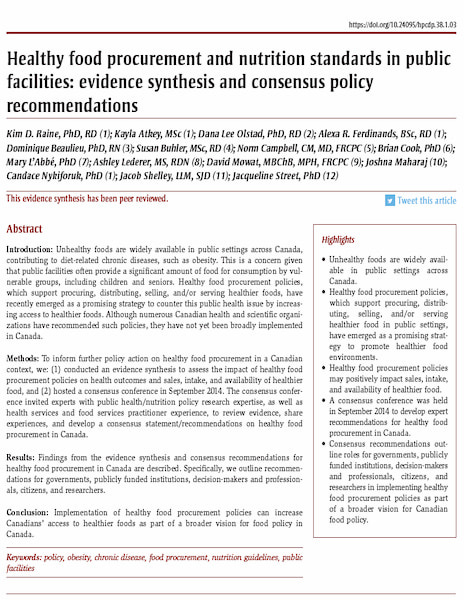
Synthesis of evidence and consensus conference to inform further policy action on healthy food procurement in Canada.
Impact of the Food-Labeling and Advertising Law Banning Competitive Food and Beverages in Chilean Public Schools, 2014–2016
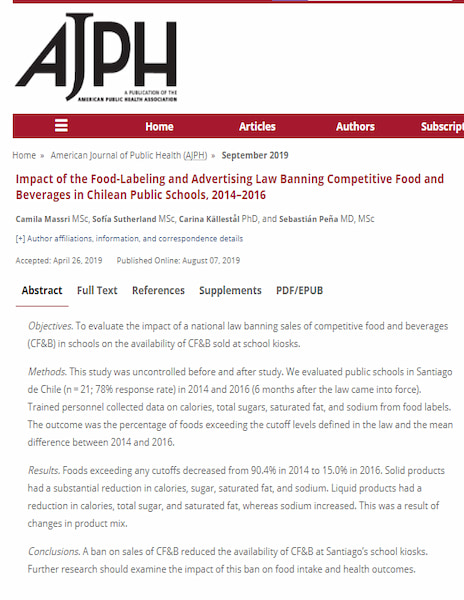
Reviews the impact of the national law banning sales of competitive food and beverages in schools, based on Chile’s Law of Food Labeling and Advertising. Results show that availability of foods exceeding cutoffs decreased from 90.4% in 2014 to 15.0% in 2016 after policy implementation.
School nutrition guidelines: overview of the implementation and evaluation
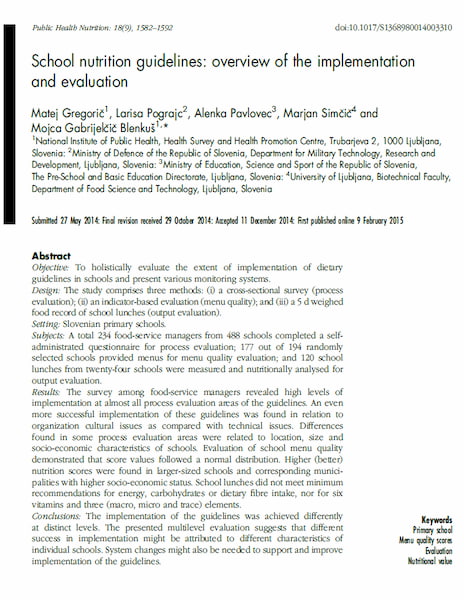
Describes three methods of evaluating the implementation of dietary guidelines in schools in Slovenia: (i) a cross-sectional survey, (ii) an indicator-based evaluation of menu quality; and (iii) a five day weighted food record of school lunches (output evaluation). The multi-level evaluation suggests that some differences in implementation are attributed to school characteristics; system changes may […]
A Global Review of Food-Based Dietary Guidelines
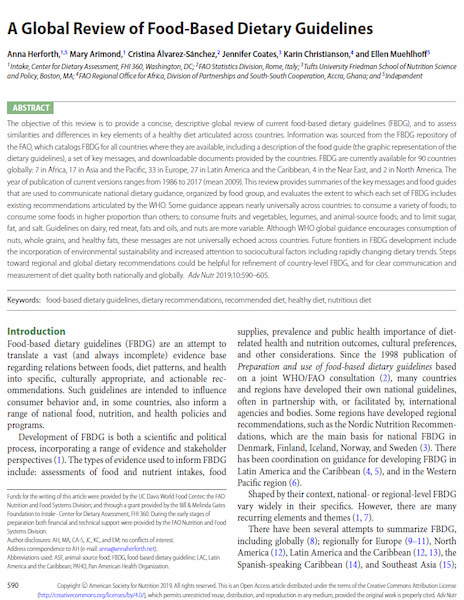
Review of current food-based dietary guidelines (FBDG), assessing the similarities and differences in key elements across countries
Healthy food procurement policies and their impact

Systematic review of the evidence base for healthy food procurement policies
The Brazilian school feeding programme: an example of an integrated programme in support of food and nutrition security
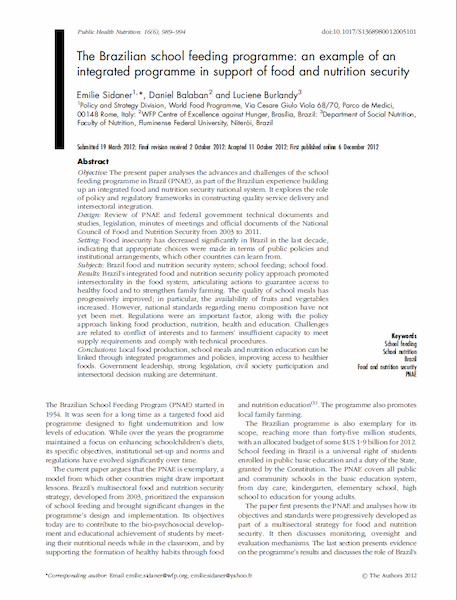
Describes the successes and challenges of the Brazil school feeding program from 2003-2011, finding that local food production, school meals, and nutrition education can be linked and result in improved access to healthier foods.
Comparison of Nutrition Standards and Other Recommended Procurement Practices for Improving Institutional Food Offerings in Los Angeles County, 2010–2012.
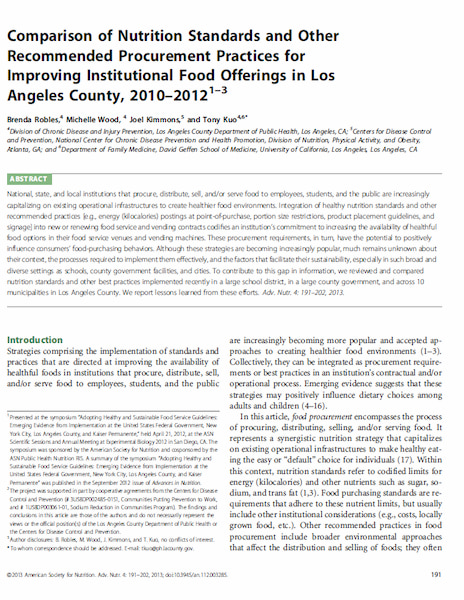
Reviews and compares nutrition standards and other best practices implemented recently in a large school district, in a large county government, and across 10 municipalities in Los Angeles County. Includes a framework for creating healthier food environments and steps to adopting and implementing nutrition standards.
Developing and Applying a Mixed-Methods Evaluation Framework to Build the Business Case for Healthy Food Procurement at the Local Level
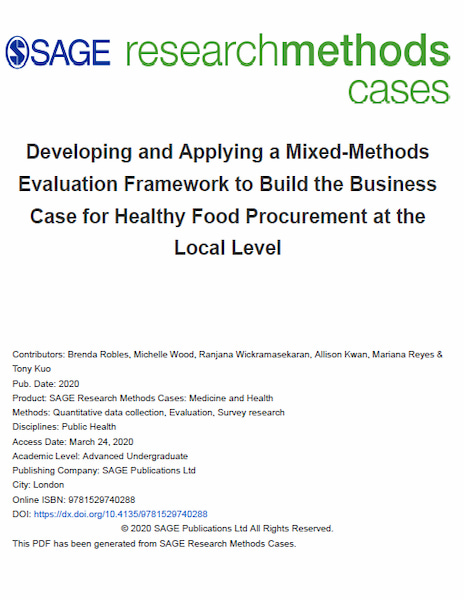
Describes an evaluation by the Los Angeles Department of Health conducted with the goal to help institutional foodservice operators grow their business while also improving the nutritional quality of foods served and sold.
Implementation lessons for school food policies and marketing restrictions in the Philippines: a qualitative policy analysis.
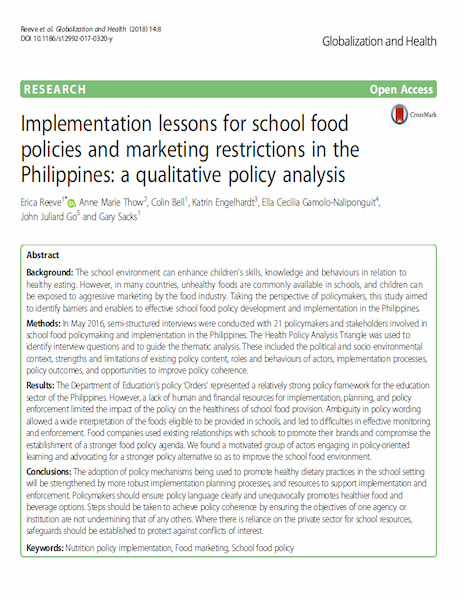
Description of challenges/barriers to consider when implementing procurement policies, particularly within a school setting.
The School Food Trust: transforming school lunches in England
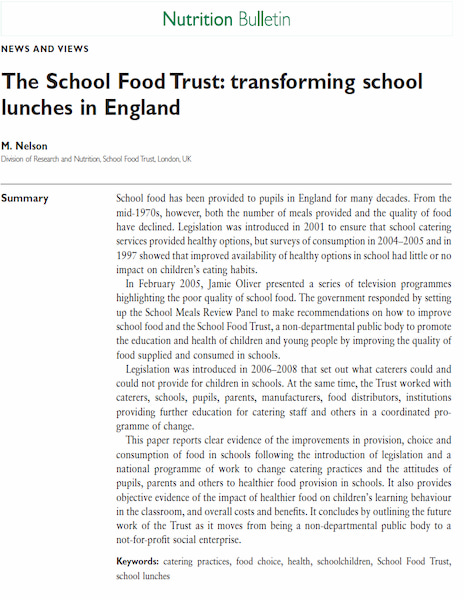
Reports evidence of the improvements in provision, choice and consumption of food in schools following the introduction of legislation and a national programme of work to change catering practices and the attitudes of pupils, parents and others to healthier food provision in schools. It also provides objective evidence of the impact of healthier food on […]
Effectiveness of school food environment policies on children’s dietary behaviors: A systematic review and meta-analysis
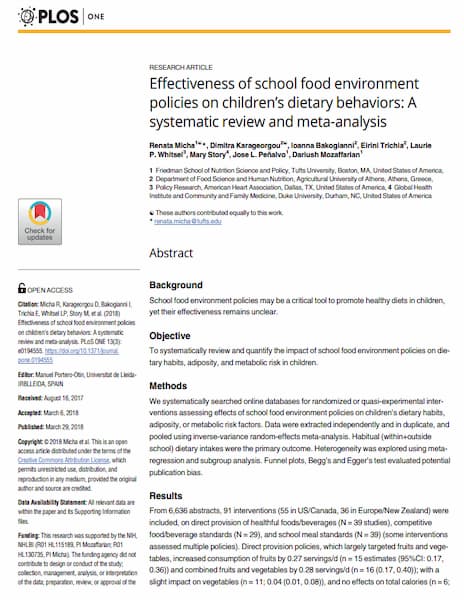
Systematic review includes 12 studies evaluating school meal standards implemented in the US, Canada, or UK, which were found to: increase fruit intake, reduce total fat, saturated fat, and sodium (but not total calories), and decrease BMI (although other adiposity measures evaluated were unchanged).
Toward a Healthier City Nutrition Standards for New York City Government
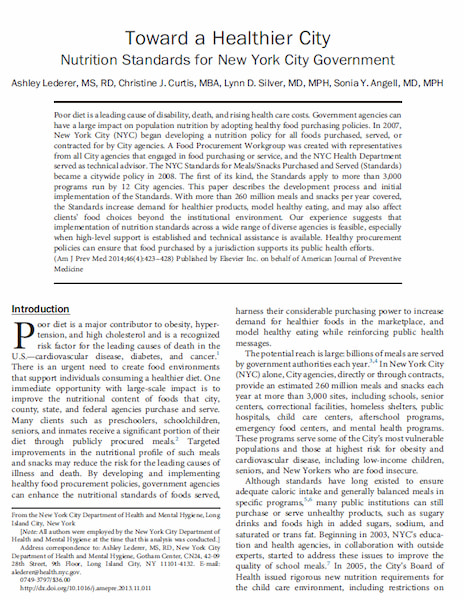
Describes the development and implementation of required nutrition standards across all New York City agencies that purchase, prepare and/or serve food.
Estimating the Potential Health Impact and Costs of Implementing a Local Policy for Food Procurement to Reduce the Consumption of Sodium in the County of Los Angeles
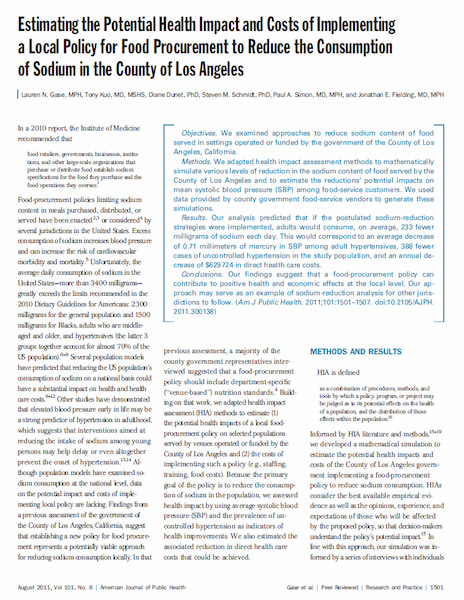
Uses health impact assessment methods to simulate levels of reduction in the sodium content of food served by Los Angeles County. Analysis predicts that adults would consume, on average, 233 fewer milligrams of sodium each day, if specific food procurement sodium strategies were implemented and models impact on blood pressure, cases of uncontrolled hypertension, and […]
Public procurement as a policy tool to promote healthier food environments and choices
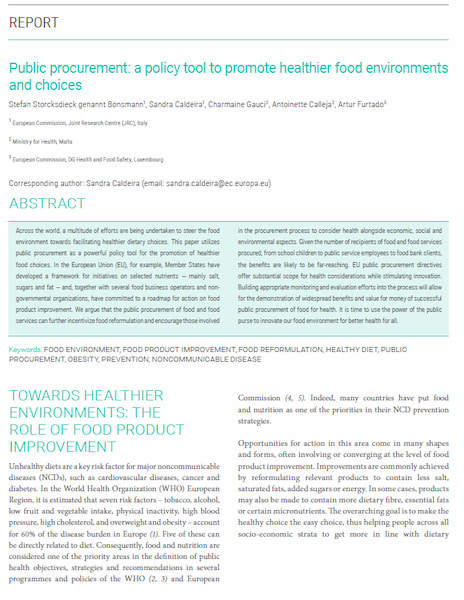
Proposes that the public procurement of food can incentivize food reformulation; urges consideration of economic, social, and environmental aspects of procurement. Includes examples of EU procurement directives.
Effect of changes to the school food environment on eating behaviours and/or body weight in children: a systematic review
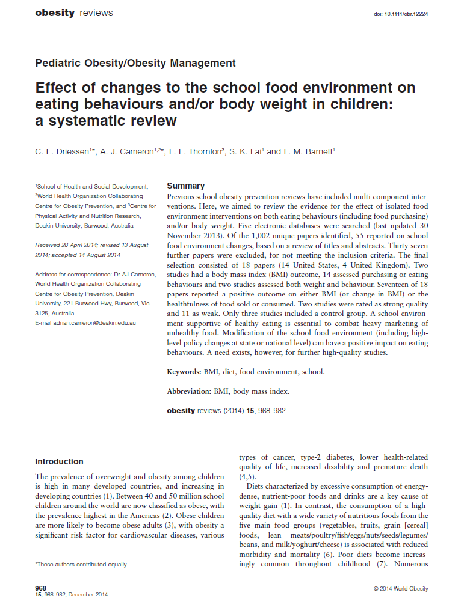
Reviews the evidence for the effect of isolated food environment interventions on both eating behaviors (including food purchasing) and/or body weight (all examples from US/UK). Seventeen of 18 papers reported a positive outcome on either BMI (or change in BMI) or the healthfulness of food sold or consumed.
Enablers and barriers to implementation of and compliance with school-based healthy food and beverage policies: a systematic literature review and meta-synthesis
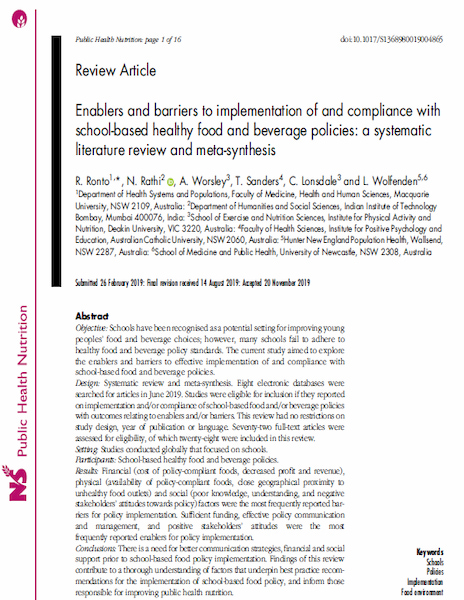
This study explores the enablers and barriers to effective implementation of and compliance with school-based food and beverage policies from countries around the world.
The Power of Procurement
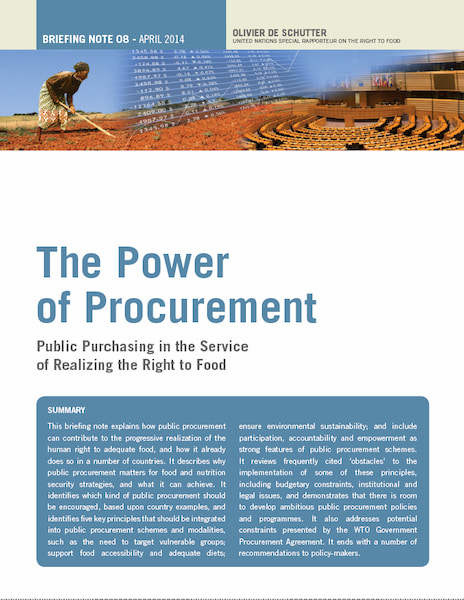
Provides an argument for: sourcing preferentially from small-scale food producers, guaranteeing fair wages and prices along the food supply chain, nutrition standards, sourcing locally whenever possible and expecting suppliers to produce food sustainably, increasing participation and accountability in the food system.
CDC’s Sodium Reduction in Communities Program: Evaluating Differential Effects in Food Service Settings, 2013–2016
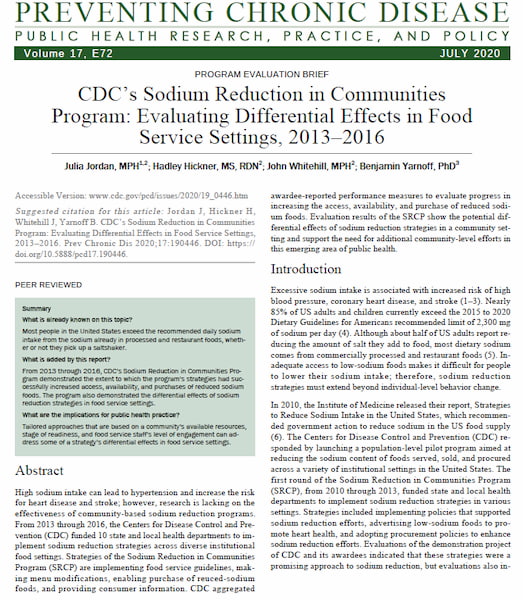
Evaluation results on sodium reduction of CDC-funded state and local health departments implementing policies including food standards among institutional food settings.
Population-level interventions in government jurisdictions for dietary sodium reduction: a Cochrane Review
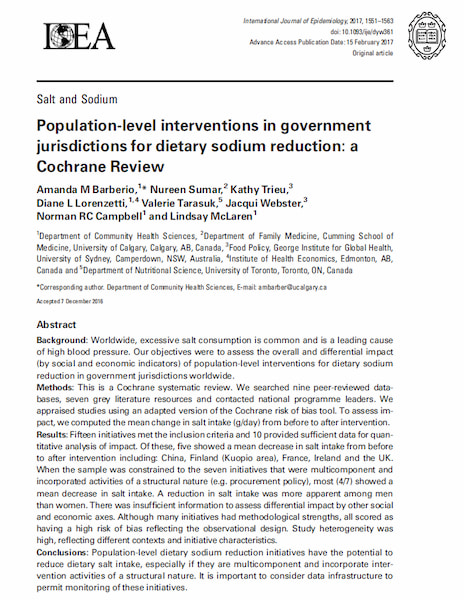
Describes the impact of population-level dietary sodium reduction interventions and concludes that multicomponent initiatives taking a structural approach (such as public procurement policies), have the potential to reduce dietary salt intake.
Healthy school meals and educational outcomes
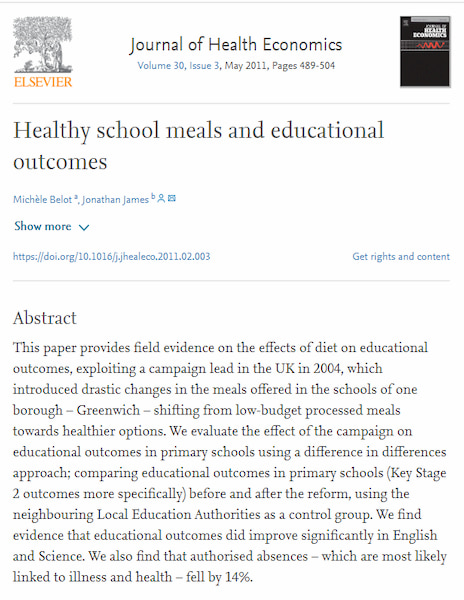
Provides evidence on the effects of diet on educational outcomes, using a campaign lead in the UK in 2004, which introduced changes in the meals offered in schools – shifting from low-budget processed meals toward healthier options. Educational outcomes improved significantly in English and Science, and authorized absences, which are most likely linked to illness […]
At the crossroads: new paradigms of food security, public health nutrition and school food
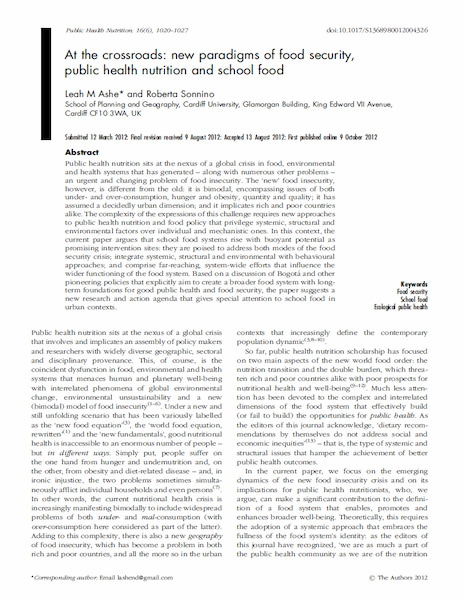
Describes the emerging dynamics of the new food insecurity crisis and its implications for public health nutritionists; suggests the adoption of a systemic approach and uses school food systems as an example.